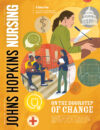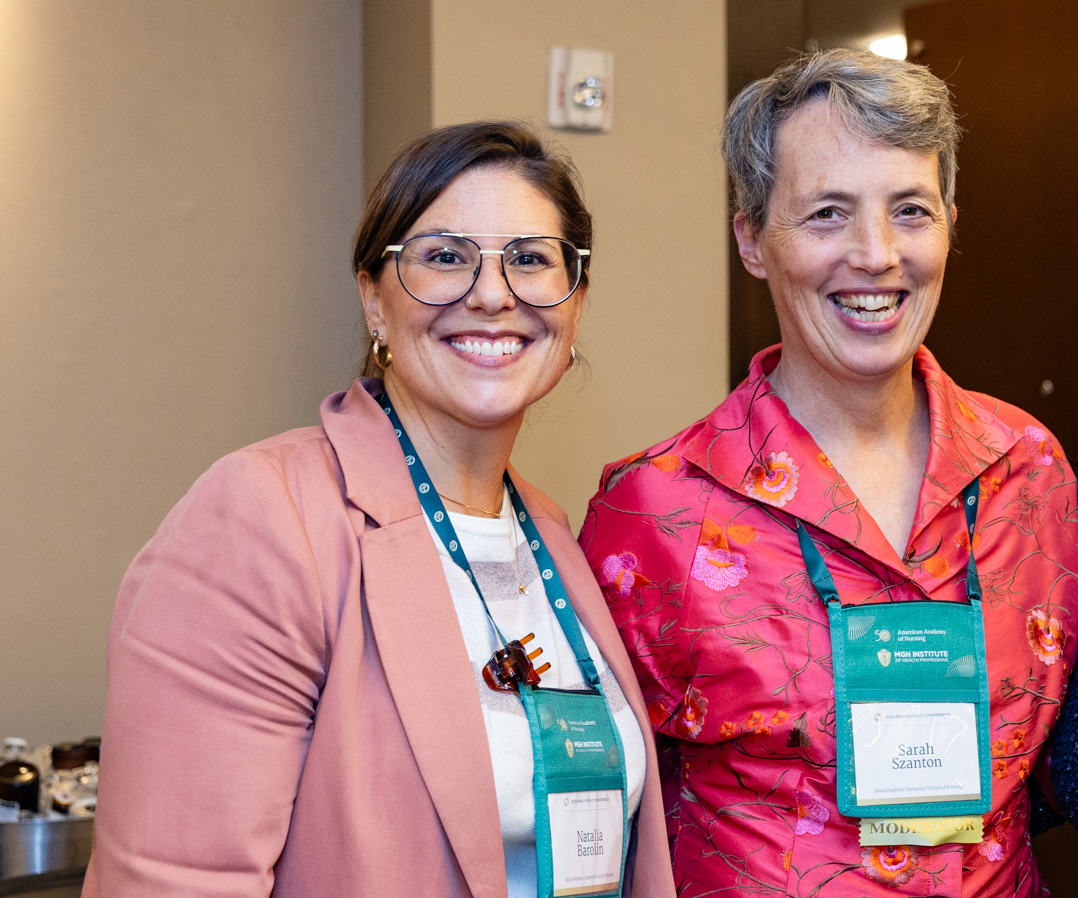Natalia Barolin has been on the delivery end of well-intentioned programs meant to address health inequities but that didn’t always work well in practice. The disconnect was obvious, and its impact was multifaceted.
“I worked in a federally qualified health center. … I was the nurse in charge of implementing [programs] in our clinic, and I could see how something that bureaucrats in a room were designing translated in the clinical setting, what worked and what didn’t.” (Spoiler alert: The information, resources, and the time it took to institute new programs often didn’t jibe.) “Patients and care teams both got frustrated. There’s this whole cascade effect from that.”
Barolin was discouraged too. She had spent the first 17 years of her career in policy and health communications, “getting to understand and communicate about the many intersectional factors that contribute to a person’s well-being and ability to meet their potential,” she explains. “It’s complex but so are we as people; we can do better to take all of that into consideration to ensure the health and well-being of individuals, families, and communities.”
As a young woman, Barolin helped her family navigate the U.S. health system and in some cases interpreted during health appointments. This made her particularly drawn to health justice and equity—“the way some groups have more opportunity to reach their potential than others.” She came face to face with the realities of privilege and racial/ethnic dynamics at an early age. Barolin is the daughter of immigrants from Uruguay. She grew up speaking Spanish at home—her grandparents didn’t speak English—and in community with other Latino immigrants. Barolin is white, of European ancestry. She observed how she and her family were treated differently than other Latino immigrants. “I’ll never forget one day a neighbor complained to my dad about all the ‘spics’ moving to our community,” she reflects. “I was mortified and couldn’t understand why he would say that to my dad, who had a very obvious accent. When I asked about it after, my dad explained that we weren’t seen the same—because of our skin color. A light bulb went off and I understood the privilege I have. It felt like a tremendous opportunity and responsibility.”
This ignited Barolin’s passion for leveling the playing field and ensuring that everyone has an equitable opportunity to thrive. Years later, she found another pathway for being a change agent. “I was providing communications support to the Robert Wood Johnson Foundation scholars and fellows and its Campaign for Action to implement the recommendations of the first Future of Nursing Report.”
“Nursing just made so much sense to me in terms of our clinical knowledge and relationship with patients and caregivers combined with our experience at the intersection of the health care team, and the social systems and structures that impact health and well-being. It was so clear that nursing offered me the frontline, firsthand knowledge of our health system so that I could be a better advocate and change agent. … I wanted a look behind the curtain.” Barolin got her hands-on way to make a difference as an RN and alumna from the Johns Hopkins School of Nursing. She’d found her voice through communications, and she was ready to raise it in service to improving health and health care. A former colleague suggested that there was a place for Barolin’s “clinical and systems lens” with the Innovation Center at CMS. She’d had the look behind the curtain. It was time for Barolin to begin tearing it down: “Let’s think about how this program translates once it’s in practice. What does it look like for the patient? What does it look like for the providers trying to deliver this intervention?”
Like that, she had her chance to bring her two careers together to impact change.
“When Sarah Szanton called and said, ‘I’d like to work on policy and take all of this to the next level as dean. Do you want to help me do that?’ … It was a no-brainer.”
Barolin leapt at the chance to become senior health policy advisor for what would become the Institute for Policy Solutions at the Johns Hopkins School of Nursing. It’s the right place at the right time for the right reasons, she insists. “It feels like the culmination of everything I’ve been doing in my career. It brings it all together in this way … and in a moment.” She explains, “There’s this momentum for us to harness, an elevated awareness of what’s not working in our health system and then the domino effect that has on the work force, and burnout, in the outcomes and experiences of the person getting care, and on the well-being of our society.”
It feels like the culmination of everything I’ve been doing in my career.
This moment must be seized. Barolin, Institute Director Vincent Guilamo-Ramos, and Szanton are all in.
“I believe in this,” Barolin says. “We believe in this. We are surrounded by people who believe in it. We know this is the moment. … We have had a tremendous response. There is so much excitement and enthusiasm around the possibility of what this institute can do. And how special and unique having this policy institute seated in a school of nursing—and in our school of nursing in particular, under Sarah and Vincent’s leadership—has just been mind-blowing. … I thought it was going to take a lot more convincing.”
The challenges of undoing, rethinking, and then rebuilding the nation’s flawed health care system remain immense but, Barolin insists, “I am encouraged and optimistic about the diversity of experience and roles of the people who are excited about this.”
She’s also certain that the mission is achievable. “It’s not like we’re inventing this stuff,” she says of research and interventions already shown to have the potential to change health, health care, and social justice for the better. “The solutions are there.”
As is the commitment.
“Getting to build something and create something alongside Sarah and Vincent is just exactly where I need to be right now. It feels like the right thing for me as a change agent, the right thing for me as a nurse, and the right thing for this country.”
Learn more about the Institute for Policy Solutions at the Johns Hopkins School of Nursing.

